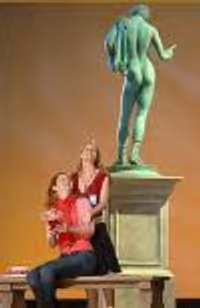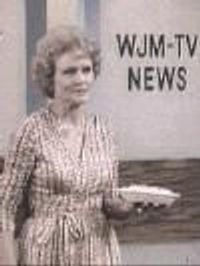End of the Rainbow Reviews
#1End of the Rainbow Reviews
Posted: 4/2/12 at 7:41pm
Backstage is positive with a love letter to Bennett:
"Despite the script’s shortcomings, “Rainbow” is a definite high. Director Terry Johnson skillfully balances the hyped-up confrontations with the quieter interludes, and Jeffrey Saver’s musical direction gives us a first-rate concert along with the story line. Tom Pelphrey, as Deans, and Michael Cumpsty, as Anthony, are at a distinct disadvantage, portraying pillars supporting Bennett’s gigantic Garland, but they handle their workmanlike assignments with professional aplomb. Jay Russell gets some laughs in three utilitarian roles.
There are productions that exist solely to feature a spectacular star. This is one of them. Rush to the Belasco to catch Bennett and revel in her—and Garland’s—glory."
http://www.backstage.com/bso/reviews-ny-theatre-broadway/ny-review-end-of-the-rainbow-1006650352.story
#2End of the Rainbow Reviews
Posted: 4/2/12 at 7:43pm
https://www.facebook.com/media/set/?set=a.264810990234284.58763.214663855248998&type=1#!/EndoftheRainbowBroadway
Updated On: 4/2/12 at 07:43 PM
FindingNamo
Broadway Legend Joined: 7/22/03
#2End of the Rainbow Reviews
Posted: 4/2/12 at 7:47pmDavid Finkle eviscerated it on Huffington Post (the phrases "character assassination" and "second rate Judy Garland impersonation" were used) but three hours later it has been "removed at the request of the blogger."
#3End of the Rainbow Reviews
Posted: 4/2/12 at 7:52pm
amNY is mixed to negative (2.5 stars) with nice words for Bennett:
"Although the play offers a raw and shocking portrait of Garland, it quickly runs out of steam. The end, where Anthony simply walks forward to address Garland's death to the audience, is especially disappointing.
...
Bennett successfully walks the fine line of convincingly portraying Garland's larger-than-life, bizarre behavior without making it feel like a campy parody. Although erratic, her Garland is also poised, witty and emotionally longing for some stability."
http://www.amny.com/urbanite-1.812039/theater-review-end-of-the-rainbow-2-5-stars-1.3639008
Updated On: 4/2/12 at 07:52 PM
#4End of the Rainbow Reviews
Posted: 4/2/12 at 8:52pm
The AP is a rave:
"The star of "The Wizard of Oz" and "Judgment at Nuremberg" is very much alive – though barely – in "End of the Rainbow," a British import that opened Monday at the Belasco Theatre. Tracie Bennett, the woman tasked with filling Garland's ruby slippers, is so stunning that she manages to raise the dead.
...
Bennett doesn't simply play the fading actress and singer – she IS Garland: haughty, mannered, funny, arch, kittenish, pleading, needy, imperious, tortured and savage. The play, by Peter Quilter, could be maudlin and precious in other hands, but Bennett sings and inhabits an American icon in her final days with such skill and fearlessness that the seams are hidden."
http://www.huffingtonpost.com/huff-wires/20120402/us-theater-review-end-of-the-rainbow/
#5End of the Rainbow Reviews
Posted: 4/2/12 at 9:17pm
The Philadelphia Inquirer is mixed:
"Somewhere over the rainbow, Judy Garland never spotted her pot of gold. But a British actress named Tracie Bennett found hers - in the person of Judy. She is sensational in the erratic Broadway show End of the Rainbow, about Garland's last attempt at a comeback, which opened Monday night.
...
Director Terry Johnson made a choice, however, and Bennett is so fine an actress, she carries it out and makes you believe, no matter what Garland she gives you, at what age. The singing's the best part of Rainbow because the script is a mixed bag: lots of lame gay jokes, a back-and-forth that demands an exaggerated Garland character who becomes static, some old-chestnut lines and some poignant ones. The story sets up a triangle between her new young manager, Mickey Deans, who would becomes her fifth husband (played by Tom Pelphrey) and her pianist (Michael Cumpsty, impressive on the piano and in his role)."
http://www.philly.com/philly/entertainment/145794165.html
#6End of the Rainbow Reviews
Posted: 4/2/12 at 9:38pm
TimeOutNewYork is negative.
"...its sympathy for the great singer is largely of the bad-faith tabloid kind, whose purported “concern” for celebrities is a tool to justify articles and photographs that paint them as grotesques....this is the kind of performance that gets lauded for its stamina....That Bennett performs this show eight times a week is a marvel indeed; seeing it just once kind of wore me out."
http://www.timeout.com/newyork/theater/end-of-the-rainbow-belasco-theatre-march-24-2012-1
#7End of the Rainbow Reviews
Posted: 4/2/12 at 10:04pm
The Hollywood Reporter is negative, calling it a "macabre sideshow":
"...writing by Peter Quilter that hits every obvious note except the pathos...the production no doubt counts on accessing the Garland worship that still endures among gay men of a certain age. Beyond that, it’s a sad spectacle that should (but doesn’t) muster some resonance...despite the flashy technique and bewildering stamina, there’s something distancing about this whole macabre sideshow....Much of the first act is a repetitive merry-go-round of fidgety high spirits, diva tantrums, maudlin self-pity, jittery agitation and self-deprecating humor....One of Quilter’s key points, which is hardly a fresh angle, is that she was “on” all the time, playing the legend even in private. That’s well and good, but it doesn’t help foster an emotional connection to the character....In Quilter’s play, we mainly get the screaming cliché, sending it more over the top than over the rainbow....While she takes her cue from the limiting material, Bennett nonetheless is such a whirlwind of manic energy that you wonder where it comes from in such a tiny, sinewy body."
http://www.hollywoodreporter.com/review/end-of-the-rainbow-theater-review-306891
#8End of the Rainbow Reviews
Posted: 4/2/12 at 10:11pm
Newsday is negative, saying:
"The only reason to endure this is Bennett's impersonation. If you look at just her face, the tiny actress with the dancer's body looks surprisingly unlike Garland. Except for moments when she talks like Katharine Hepburn, she has the sound -- the phrasing and the wobble as wide as her character's mood swings. And she has the moves -- leaning back on her spine and grabbing the air as if she thinks it can hold her up.
It is a gutsy portrayal of an artist who, apparently, was too much for herself, who put more into her performances than she got back as a person. I get the message. I just don't get the point."
http://www.newsday.com/entertainment/theater/star-channels-garland-but-the-play-can-t-1.3638782
#9End of the Rainbow Reviews
Posted: 4/2/12 at 10:12pm
Brantley likes her again in the Times, as he did when he saw it in London.
http://theater.nytimes.com/2012/04/03/theater/reviews/end-of-the-rainbow-on-judy-garland-at-belasco-theater.html
#10End of the Rainbow Reviews
Posted: 4/2/12 at 10:14pmI'll stick with "I Could Go On Singing" on DVD. Is this sort of play really necessary?
#11End of the Rainbow Reviews
Posted: 4/2/12 at 10:19pmWow; that's a seriously awesome review from Brantley. Can't wait to see this on Wednesday!
#12End of the Rainbow Reviews
Posted: 4/2/12 at 10:26pm
Here's the review that was pulled down from Huffington Post. Thank you to TulitaPepsi for rescuing it. Thank you very much. I can't express it any other way...
Oh...and I think this review would labeled negative.
====
End of the Rainbow Disses Judy Garland Bigtime
by David Finkle
Libel is actionable legally, and I wouldn't go so far as to cry "libel," while dismissing with disgust End of the Rainbow, the so-called play about Judy Garland that's just opened at the Belasco. I will say that, while character assassination doesn't usually lead to lawsuits (possibly because difficult to prove), character assassination is exactly what playwright Peter Quilter is committing in a fifth-rate work featuring Tracie Bennett's second-rate impersonation of the iconic performer.
Mostly set in William Dudley's undoubtedly accurate representation of a swanky London hotel suite, the two-act hatchet job purports to illustrate how recklessly the singer behaved in private and public during a five-week 1968 stint at the famed Talk of the Town, which is also shown during some sequences. In the mad pavane that takes place only a few months before Garland's death, she's joined by fifth and last hubby Mickey Deems (Tom Pelphrey), who's sometimes dictatorial and sometimes obsequious. Also on hand to endure Garland's charmless mood-swings is swishy Scottish accompanist Anthony (Michael Cumpsty, employing an in-and-out accent), who's given no last name -- perhaps because he's a composite of several accompanying pianists.
During the period covered, this Garland claims she's found true happiness at last with Deems. To prove it, she frequently jumps his bones. Yet, at other times she comes to blows with him for denying her the Ritalin-and-whiskey cocktails from which at other moments she insists she's ready to abstain. While humiliating hotel management on phone calls over bills she's not paying, she also spends repetitious time trying to duck performances for (unseen) impresario Bernard Delfont.
In varying degrees of sobriety, this Garland does show up for the Talk of the Town appearances. This gives Bennett the opportunity to reprise the former Frances Gumm's signature songs. Throughout the tremolo-filled warbling, she certainly sounds more like her predecessor than when she's haltingly and breathily speaking the dialog attributed to Garland.
And hey, does Quilter save "Over the Rainbow" for last? What do you think? Does director Terry Johnson see to it that Bennett delivers a terrifyingly manic version of "Come Rain or Come Shine" supposed to mimic Garland at her hopped-up worst? What do you think? N.B.: For this egregious Harold Arlen-Johnny Mercer turn, Bennett receives appreciative applause from an audience totally missing the dramatic point?
No one familiar with Garland's career will deny she suffered from ultimately debilitating drug and alcohol problems. Records dating from her marvelous yet cruelly exploitive Metro-Goldwyn-Mayer days establish as much. Garland may also have had the habitually dirty mouth she has in this treatment. Why wouldn't she, considering the milieu in which she received her lessons on real life?
But to show her exclusively as a desperate pill-popping, booze-swilling, four-letter-word-spouting monster says nothing more than that a group of people (Quilter, director Johnson, the two handfuls of producers) have decided they stand a chance at making a heap of dough trashing the Garland name to a public assumed to want nothing more from their entertainments than something on a Jerry Springer level. Maybe the purveyors have been affirmed in this regard by the positive response in London, from whence the opus is imported.
Through much of her troubled times -- and they were legion -- Garland almost never lost her sense of humor. She was a truly witty woman, who may have had to hone her humor as a survival technique. This Garland is consistently crude when Quilter thinks he has her cracking actual jokes. She's unrelievedly petty and pouting, someone whose enormous talent is in total shreds -- except on the occasions she's able to go on songbird automatic-pilot.
Among other affronts to which the perpetrators of End of the Rainbow lower themselves is putting on display a vulgar piece that might be seen by Garland's three children -- for whom she regularly expressed deeply-felt maternal love. Liza Minnelli, Lorna Luft and Joey Luft have to be well aware of their mother's minuses as well as the pluses ignored here. Noticeably, not one offspring is mentioned through the proceedings -- perhaps according to lawyers' advice.
On their behalf and on behalf of Garland's fans (many slammed for being homosexual stereotypes who reveled in the star's troubles), a reviewer is obligated to say, "Shame on those behind the miserable enterprise."
#13End of the Rainbow Reviews
Posted: 4/2/12 at 10:33pm
Nobody cares pj
We know you and a few others hate the show. Fine, but why don't you post on a show that you like? Did you even SEE the show?
#14End of the Rainbow Reviews
Posted: 4/2/12 at 10:38pmI'm seeing it next week, tiny. Really looking forward to it now.
#15End of the Rainbow Reviews
Posted: 4/2/12 at 10:45pm
Question 1: Why was the Huffington Post review taken down
Question 2: Why isn't the NYT review linked like the others?
Updated On: 4/2/12 at 10:45 PM
srg129
Stand-by Joined: 7/15/08
#16End of the Rainbow Reviews
Posted: 4/2/12 at 10:51pm
Entertainment Weekly is postive with a love letter to Tracie Bennett:
http://www.ew.com/ew/article/0,,20364394_20583845,00.html
Updated On: 4/2/12 at 10:51 PM
#17End of the Rainbow Reviews
Posted: 4/2/12 at 10:51pm
Added the Times link.
Jeremy Gerard in Bloomberg BusinessWeek is negative:
Judy Garland Vomits on Her Rainbow in New Show: Review
Dead and buried 43 years in June, Judy Garland still provides carrion for vultures.
“End of the Rainbow,” a London hit now transferred to Broadway, is the latest shameless attempt to capitalize on a life whose unhappy conclusion is as storied as the stardom that preceded it.
Tracie Bennett stars (if such a word can be applied to an impersonation bettered any night in any downtown drag bar) as Judy in late 1968.
Pills, booze and paranoia have made her all but unbookable. A new fiance has taken over her management, determined to clean her up and get her in shape for a grueling run of performances in London. They have bills to pay.
The setting is a posh hotel suite (nicely rendered by William Dudley) that the nearly impoverished star deems unfit for midgets. That’s the level of humor in abundance here.
Mickey Deans, the midnight cowboy who will eventually give in to Judy’s demands for pharmaceutical assistance when she predictably falls apart on stage, is played by Tom Pelphrey. The gifted Michael Cumpsty plays Anthony, the gay music director/accompanist who loves her.
See Judy pop pills. Watch Judy vomit. Avert your eyes as Judy services her young buck. Listen as Judy, jazzed on Ritalin, loudly unravels before an adoring audience.
No Soul
In each of these scenelets, Bennett -- small, angular, hard -- is undoubtedly accurate, except for the soul part.
We are treated to awful snippets from such signature numbers as “The Man That Got Away” and “The Trolley Song,” though none of the ballads that might have given the show a tiny bit of humanity. Six months after these performances, in June 1969, she was dead.
A saving grace for this unsalvageable travesty is the superb five-piece ensemble that augments the piano during the concert sections. They swing. You could listen to them all night.
http://www.businessweek.com/news/2012-04-02/judy-garland-vomits-on-her-rainbow-in-new-show-review
srg129
Stand-by Joined: 7/15/08
#18End of the Rainbow Reviews
Posted: 4/2/12 at 10:54pm
LOL Most deluded, biased review of the year is awarded to "blogger" David Finkle (it's no wonder this hack "blogs" at the Huffington Post):
Libel is actionable legally, and I wouldn't go so far as to cry "libel," while dismissing with disgust End of the Rainbow, the so-called play about Judy Garland that's just opened at the Belasco. I will say that, while character assassination doesn't usually lead to lawsuits (possibly because difficult to prove), character assassination is exactly what playwright Peter Quilter is committing in a fifth-rate work featuring Tracie Bennett's second-rate impersonation of the iconic performer.
Updated On: 4/2/12 at 10:54 PM
#19End of the Rainbow Reviews
Posted: 4/2/12 at 10:58pmNo matter how you slice it, Pal, these are overall some pretty strong reviews. At the very least, for Ms. Bennett, who suddenly seems like a major threat in the Best Actress in a Play race.
#20End of the Rainbow Reviews
Posted: 4/2/12 at 10:58pm
Ok, PJ, we KNOW you'll hate it. Fine.
However, the absolute truth is that 95%+ of the audiences for the past 2 wks LOVE it, and really, really enjoy themselves. Remember that most Bway audiences these days are NOT mainly theatre nuts like we are. They're B
& Ts, American and European tourists.
I accept your problem with it, and do not judge you for it. Critics, even when giving raves have little to do anymore with selling a show. Bad reviews can hurt a small show, however internet marketing has totally changed the landscape of marketing. I happen to believe that WOM (word of mouth) is VERY important for this show..
At least get drunk if you hate the show...I'll have respect for you! LOL!
srg129
Stand-by Joined: 7/15/08
#21End of the Rainbow Reviews
Posted: 4/2/12 at 11:01pm
Theatermania is positive:
http://www.theatermania.com/broadway/reviews/04-2012/end-of-the-rainbow_53460.html
#22End of the Rainbow Reviews
Posted: 4/2/12 at 11:02pm
To say Brantley liked it is an understatement. It was an all out rave. That love letter to Tracie is almost as good as a Tony.
"Ms. Bennett seems to keep every chapter of that history, and the disjunctive reality it created, alive in her performance. Foul-mouthed, flirtatious, hypersexual, childlike (though never innocent), unedited, manipulative and supremely self-conscious: Ms. Bennett’s Garland is all these things as she makes love and war with Mickey and Anthony.
She has a strong sense of herself as a human tragedy on a world stage, but her sense of humor, of the absurdity of it all, is just as sharp. (Some of her zingers, mostly unprintable here, are appallingly funny.) She is, in other words, a raging mess who can’t help how she behaves and knows it, which to me is a fair definition of hell.
And then she sings. (The onstage band, behind a scrim, is excellent.) And all those disparate, desperate elements coalesce into a coherent, riveting whole. That Ms. Bennett, performing Garland’s signature pieces, often sounds uncannily like the real thing wouldn’t count for much without this enriching context. In numbers that include a gorgeously introspective “Man That Got Away” and a terrifyingly manic, Ritalin-fueled “Come Rain or Come Shine,” you hear not only the music but also where it comes from. Empathy trumps exhibitionism."
#23End of the Rainbow Reviews
Posted: 4/2/12 at 11:05pm
My friend and I are planning on drinking as much Liebfraumilch as we can locate.
He's going to try and score a handful of Ritalin for each of us.
We're going to try to refrain from booing or barking back at the stage when she does the dog bit.
iluvtheatertrash
Broadway Legend Joined: 11/9/04
#24End of the Rainbow Reviews
Posted: 4/2/12 at 11:07pm
Very disappointed Brantley didn't give this the kiss of death it deserves. What a tasteless, classless, trashy play that completely disrespects the legend. And don't even get me started on Bennett's scenery-chewing. I haven't viscerally hated a show in a long time. Maybe ever. But this one reaaaaaaaaaaaaaaaaally peeved me.
That Bloomberg review hit the nail on the head for me.
Videos






